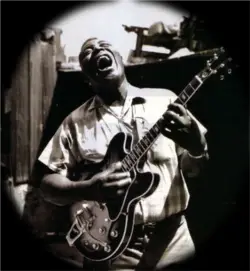HOWLIN’ WOLF

Howlin' Wolf was a scary man on stage. Six foot three and weighing over three hundred pounds, he would jump around, throw himself on the floor, twitch like he was having an epileptic fit and generally act as if he was in the grip of furious demons.
His deep bass voice sounded like sandpaper on gravel, but in a flash it could soar into an eerie falsetto or a pained animal whoop.
Wolf performed his Blues for the audience with an awesome physical power and pent-up violence that left them in absolutely no doubt that they were in the prescence of a primeval force of nature.
As a young man, Chester Burnett learned from the best. On his 18th birthday the Delta farm boy had a chance encounter with Charley Patton which led to him taking on the 'Wolf' tag and imitating the vocal style and stagecraft of his mentor.
Later his half-sister married Rice Miller (Sonny Boy II) and again the skills of a master were available to young Chester.
The Patton imitator learned to add some driving rhythmic harp to his act, and in the 30's 'Wolf' was seen all over the Delta with his guitar and neck-rack for his harp.
He was not a great instrumentalist, but he knew how to put on a show. He shared the stage and absorbed the influences of Robert Johnson, Willie Brown, Robert Jr. Lockwood, Tommy Johnson and many others.
Wolf sings 'Smokestack Lightnin' on an American Blues Tour;
Soon after returning from WWII, Wolf moved to West Memphis, Arkansas, where he resumed farming and playing his Blues.
In 1948 he got a regular 15-minute slot on radio KWEM, alternating his down-home Blues with farm reports and his own advertising endorsements!
When Wolf went electric and added the aggressive sound of Willie Johnson on guitar, the air-waves and dance-halls got a big earful of things to come.
Recommended Album
The Wolf had the most iconic voice in Blues music. The singles collected here show the brute force of Wolf's personality, captured in Chess Studios house style, with their finest side-men performing those Willie Dixon classics.
Ike Turner was working as a scout for Sam Phillips in Memphis and soon Wolf's band had laid down 'Moanin' at Midnight' and 'How Many More Years'.
Phillips' 'Memphis Recording Service' had not yet become Sun Records so he leased the tapes to Chess Records in Chicago and the Bihari Brothers Modern Records in L.A. Suddenly the young farmer had two hit records and two leading record companies wanting his signature on a contract.
In 1953 Wolf moved to Chicago and became one of the legends of Chess records. He teamed up with guitarist Hubert Sumlin whose subtle soloing style behind Wolf's voice was a hallmark of a long string of hit records.
Smokestack Lightnin', I Ain't Superstitious, Little Red Rooster, Spoonful and Wang Dang Doodle were all Willie Dixon songs made famous by Wolf. Muddy Waters was the other big star at Chess, and he also had many hits with Dixon songs, so the two front-men were in direct and sometimes acrimonious competition for new songs. Arguably, this rivalry drove both men to greater heights.
The Rolling Stones introduce Wolf to US network television;
Wolf toured Europe in the early 60's with the American Blues Festival and in 1965 played for millions on American TV when the Rolling Stones insisted on having Wolf as their support act on 'Shindig'.
Blues-rock fans all over the world recognised Wolf as the genuine article: a Delta Bluesman who conquered Memphis, then Chicago and then the world.
In 1970 Wolf cut an album with Eric Clapton and a host of British rock stars at the 'London Sessions', but it did not turn out well.
Wolf had suffered a serious car accident earlier in the year, and the resultant kidney damage and recurring heart problems caused him to slow down.

The Wolf's last Howl came in November 1975 when he appeared at a Chicago club with BB King, but sadly he did not survive the winter.